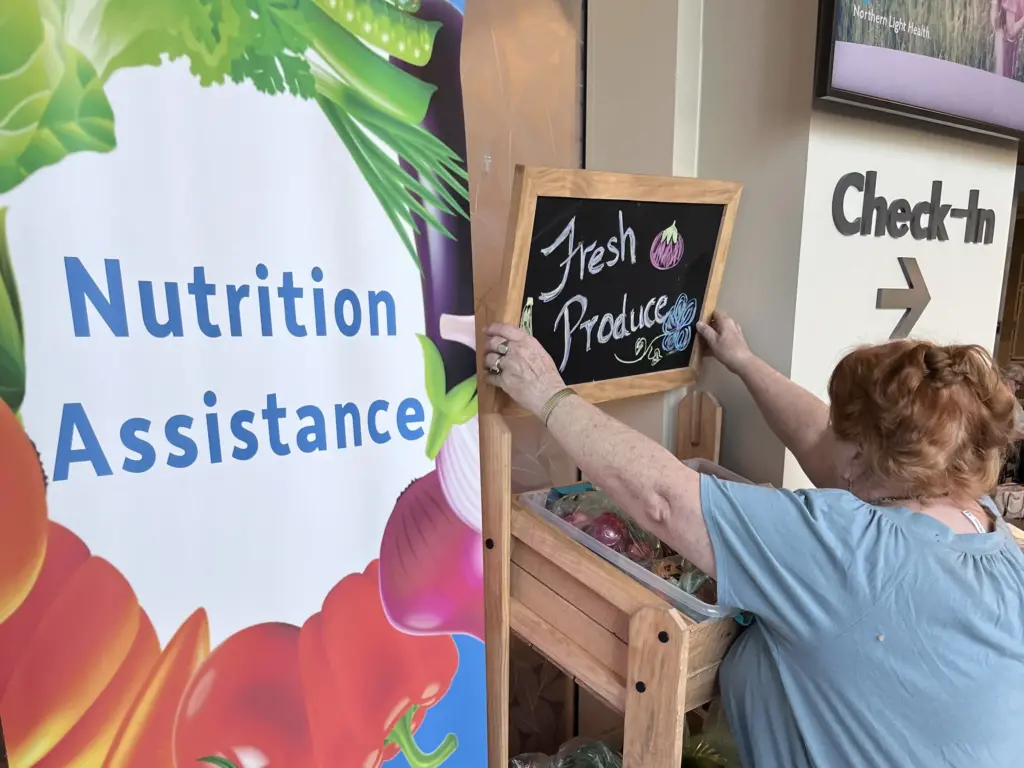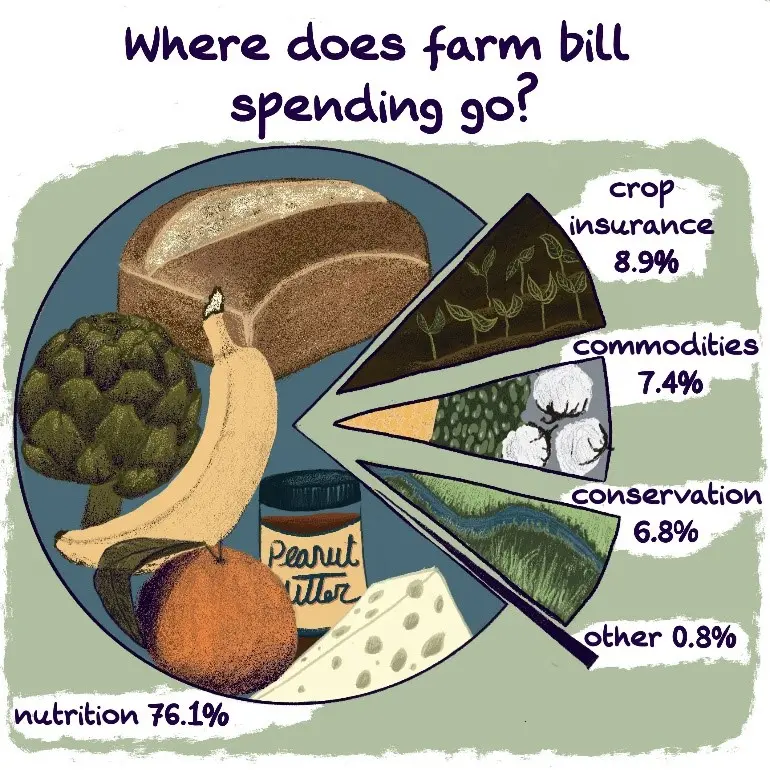The Food Bank’s 2024 Farm Bill Priorities
Hunger exists in every county and neighborhood in Maine. Nearly x Mainers are facing hunger. 1 in 7 children do not know where their next meal is coming from. As grocery bills and other costs of living continue to rise in Maine, Good Shepherd Food Bank and its 600+ partners are here for Mainers facing hunger. But the emergency food network cannot fill in the gaps alone.
SNAP is the most effective anti-hunger program in the U.S.
We invite all Mainers to raise our collective voice to urge Congress to protect and strengthen our nation’s nutrition and agriculture programs in the next Farm Bill.

1. Protect & Strengthen The Supplemental Nutrition Assistance Program (SNAP)
- Permanently end the prohibition on the use of SNAP benefits to purchase hot, prepared foods from SNAP food retailers.
- Ensure SNAP’s purchasing power aligns with rising grocery prices and cost of living by maintaining the Thrifty Food Plan every five years, allowing for continued modernization of SNAP.
- Simplify SNAP eligibility and expand access for populations that are disproportionately impacted by food insecurity.
- Exclude the Basic Allowance for Housing from income calculations for SNAP so that more active-duty members in need can qualify for SNAP benefits.
- Expand access to SNAP for disabled veterans by amending the definition of “elderly or disabled.”
- Simplify certification periods for older adults with no earned incomes.
- Improve access to SNAP for college students by changing existing restrictions and work requirements.
- Restore access to public programs for lawfully present immigrants by removing the five-year waiting period and other restrictions to SNAP eligibility.
- Protect SNAP choice and focus on ensuring affordable access to nutritious foods.
- Permanently end the prohibition on the use of SNAP benefits to purchase hot, prepared foods from SNAP food retailers.
2. Strengthen The Emergency Food Assistance Program (TEFAP)
- TEFAP food purchases help Good Shepherd Food Bank better serve Mainers facing food insecurity. Charitable donations alone can’t ensure that families get enough to eat – we need the government to do its part to help keep shelves full.
- Double funding for TEFAP food purchases.
- Increase funding for TEFAP storage and distribution to $200 million per year.
- Continue to provide $15 million per year for TEFAP infrastructure grants.
- Boost funding for the TEFAP Farm to Food Bank Program.
3. Strengthen Programs that Support Both Mainers Facing Hunger and Local Farm Producers
- Expand funding, access, and project scopes in the GusNIP Program.
- Allow frozen produce to be included in GusNIP programming.
- Expand funding for the Local Foods Purchase Agreement Program (LFPA).
- Establish an Office of Food Loss and Waste at the USDA to support efforts to increase the flow of rescued food to food banks.
What is the Farm Bill?
The U.S. Farm Bill is the largest piece of federal legislation for food and agriculture. Congress seeks to reauthorize the Farm Bill every 5-7 years. The Farm Bill is an omnibus piece of legislation. Omnibus legislation means it is a very large multipart bill package that includes funding and policies for a wide range of nutrition and agriculture programs.
The Farm Bill is made up of multiple “titles.” Each title refers to a specific policy area contained in the Farm Bill. If we think of the farm bill as a pie, each title is a slice.
Although it is called the Farm Bill, the largest piece of the pie is the Nutrition Title. The Nutrition Title reauthorizes funding for the nation’s most important food assistance programs such as the Supplemental Nutrition Assistance Program (SNAP, formerly the Food Stamp Program) and The Emergency Food Assistance Program (TEFAP). You can learn more about the nutrition programs typically reauthorized in a Farm bill here.
The Farm Bill has a long history of being a strong piece of bipartisan legislation. It takes meaningful collaboration and negotiation amongst lawmakers of both parties to develop a Farm Bill that seeks improvements for everyone.
Congress passes a new farm bill approximately every five years—a process called reauthorization—and right now, lawmakers are behind schedule. The last farm bill was passed in 2018. Lawmakers approved an extension of the 2018 Farm Bill in November 2023. That means we have a few more months to make sure the next farm bill is as strong as it can be!
What is a Marker Bill?
A marker bill is a proposed piece of legislation (bill) introduced to Congress to signal policy ideas. It is a way to build support for legislation ideas with the goal that the maker bill will eventually be included in larger legislation such as the Farm Bill.
Marker bills help lawmakers and grassroots advocates alike build policy support for asks. These bills do not generally become law as stand-alone bills.
Marker bills are introduced by Members of Congress. The person who introduces a bill is called the bill sponsor.
Once the marker bill has been introduced, other lawmakers can show support by becoming a “cosponsor” of the bill. The more cosponsors a bill has, the easier it is for its original sponsor to make the case for including its ideas in the relevant omnibus legislation.
Marker bills are very important in steering debates and discussions while committees draft legislation.
Good Shepherd Food Bank supports the following Marker Bills related to Nutrition Programs in the Farm Bill:
Supplemental Nutrition Assistance Program (SNAP)
- Modernization and Improved Benefit Adequacy
- Expanded Access for Active Military Members and Veterans
- Improved Access for Older Adults
- Ensure Access to SNAP is More Equitable
The Emergency Food Assistance Program (TEFAP)
- Farmers Feeding America Act (H.R. 6203 /S. 2713)
- EAT Healthy Foods from Local Farmers Act (H.R. 4185)
- STORE Act of 2023 (H.R. 5136)
Commodity Supplemental Food Program (CSFP)
- Delivering for Rural Seniors Act of 2023 (H.R. 4745)
Gus Schumacher Nutritional
- GusNIP Expansion Act of 2023 (H.R. 4856)
Local Food Purchase Assistance Cooperative Agreement Program (LFPA)
- Expanding Access to (EAT) Local Foods Act (Bill Text NA)
